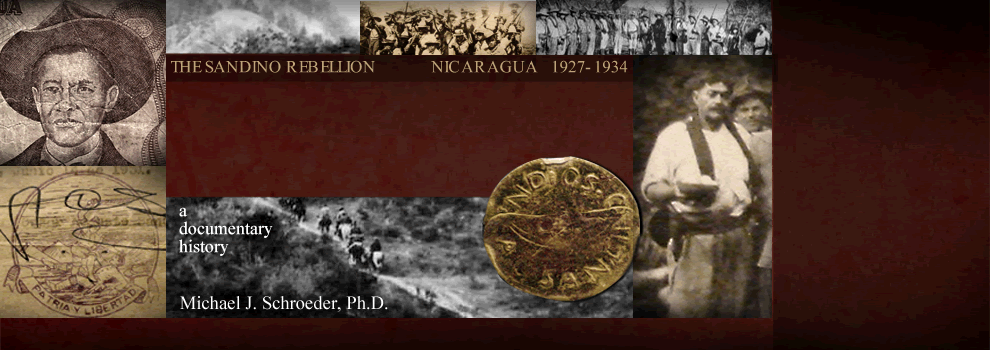|
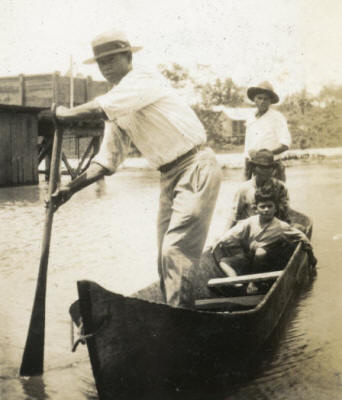 THIS IS THE FOURTH PAGE OF
DOCUMENTS FOR THE PERIOD THROUGH 1927
on Nicaragua's Caribbean Coast region, housing
materials dated during the 58 days from July 13 to
September 8.
THIS IS THE FOURTH PAGE OF
DOCUMENTS FOR THE PERIOD THROUGH 1927
on Nicaragua's Caribbean Coast region, housing
materials dated during the 58 days from July 13 to
September 8.
The after-effects of the
civil war continue rippling
throughout the region. Cabo Gracias
a Dios businessman Albert Fagot's
lawyer in Bluefields, Leónidas
Segundo Mena, writes of being
imprisoned for 59 days in
August-September 1926 by the
Conservative Chamorro-Díaz regime,
and his predicament of not being
able to represent his client's
interests because of his
imprisonment without trial or
hearing. Albert Fagot, it turns out,
was in the midst of a lawsuit
against one Señor Ibarra dating back
to the early 1920s. These facts shed
considerable light on the pre-1927
life of Albert Fagot, who later
became a key cultural intermediary
between the Marines and the Miskitu
along the Río Coco. The Aug. 5
letter from H. E. Fagot of Puerto
Cabezas adds another piece to the
puzzle. Meanwhile the business of
the USA continues to be business, as
Consul McConnico's 12-page report of
July 13, "Trade Promotion Work at
Bluefields" makes plain. There are
many fascinating documents here,
including George Napoleons' from the
Neptune Mine (8 Aug); Henry Spears'
to the department's jefe político
and the US consul (17 Aug); and C.
L. Veitch's letter describing a
series of fires at Bragmans Bluff
and labor conditions there and
elsewhere in the region (Aug 27).
Kendall's intelligence reports are
also well worth reading (8 Sept).
As before, there is an
enormous amount going on here, and
aside from rumors, none of it has to
do with Sandino.
|
|
PERIOD MAPS
|
|
1894 mosquito
shore

27 MB,
library of congress
|
1920s
Standard Fruit

6.5 mb,
US National archives
|
1928 Rio wanks
Patrol

3 mb, us
national archives
|
1931 Moravian

2.4 mb,
comenius press
|
|
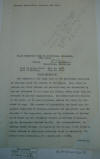
|
1.
13 July 1927.
"Trade Promotion Work At Bluefields"
(No. 181), Report by
US Consul A. J.
McConnico, Bluefields, p. 1.
"TRADE EXPANSION.
¶ The commercial and other work of
the Bluefields Consulate is entirely
under the control of the Consul. When
trade inquiries and other letters are
received they are classified by him and
delivered to the clerk for record, after
which they are returned to him for
consideration. He either dictates
replies to the clerk, or in some
instances, writes the reply for the
clerk to copy. His sources of
information are based upon inquiries
submitted to leading merchants and
importers; upon the records of the
consulate, reports of the Collector of
Customs at El Bluff and the Collector
General of Customs at Managua, and the
Nicaragua Customer Tariff. All
correspondence, including trade letters,
is signed by the Consul, there being no
other officer to whom such authority
could be delegated, the office force
consisting of a consul and a clerk.
¶ According . . . "
|
|
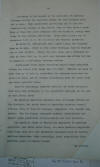
|
2.
13 July 1927.
"Trade Promotion Work At Bluefields"
(No. 181), Report by
US Consul A. J.
McConnico, Bluefields, p. 2.
" . . . According
to the records of the consulate, 24
American salesman visited the consulate
during the last calendar year, and to
date. They constituted practically
all of such representatives calling at
Bluefields, some of them twice a year.
Most of them were quite familiar with
the district, having made trips to this
section repeatedly. Their main
purpose was to ascertain facts as to the
political and economic situation . ¶
No Forms No. 244-Revised were issued
during the calendar year or to date.
There is but little traveling done by
business men of this section.
Those, who have gone, had a definite
object in view; that is, to meet some
business man of New Orleans in regard to
a particular business matter. ¶
Sixty-eight World Trade Directory
Reports were submitted during the fiscal
year ended June 30, 1927. Efforts
are made to keep them up to date by
consulting the concerns upon whom
reports are made, and by seeking
information from the local bank and
other reliable firms. ¶
Reports concerning concrete results of
trade extension work have been forwarded
to the Department annually at the end of
each fiscal year. ¶ No
American importers maintain main or
branch offices in the district, but
seven American exporters maintain branch
offices. Five of them are mahogany
companies; two, banana companies.
The two banana companies operate
commissaries and import large quantities
of merchandise and food products.
¶ Six American firms of Bluefields
represent 35 American exporters; and
three other firms, six more American
exporters. Some firms also have
the exclusive representation of certain
American exporters, thus preventing
local competitors from handling goods of
similar brand. ¶ No foreign
. . . "
|
|
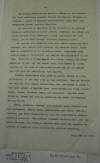
|
3.
13 July 1927.
"Trade Promotion Work At Bluefields"
(No. 181), Report by
US Consul A. J.
McConnico, Bluefields, p. 3. "
. . . No foreign manufactures maintain
offices in the district. One local
commission house (R. Fransen and
Company, Belgian) represents a number of
European manufacturers. This firm
also represents several American
exporters. ¶ The practice of
importers in the district is to purchase
American merchandise on direct orders.
Sometime the orders are placed through
local commission houses, especially for
food stuffs, and at times through
traveling representatives. ¶
No reports were submitted from this
office during the last calendar year
dealing with openings for American
trade. There were no opportunities
for promoting trade. Conditions
were chaotic owing to hostilities and
warlike activities most of the time.
There was a strong demand for rifles,
cannon, and other munitions of war, and
the demand could have served as a real
opening for the sale of such manufacture
had not statecraft dictated measures
prohibiting such imports. ¶
Foreign competition with American goods,
except in a few particulars, is not very
keen in this district. English
threads and teas are sold almost
exclusively, and preference is given to
the floor grades of English dress goods
(cotton and silk), cassimeres, linens,
Victoria lawns, and nainsooks.
English sweet biscuits, tinned and
bottled preserves and meats are demanded
in quantities. ¶ German
blankets, hosiery, and enameled ware,
Italian hats and cottonades, French
dress goods (cotton and silk), ribbons,
hosiery, and fancy foodstuffs in tins
are preferred to similar American
products. The average consumer
contends that, for the price demanded,
the foreign products mentioned are
superior in quality or grade to those
supplied by American exporters. ¶
Fully 85 per cent. . . . "
|
|
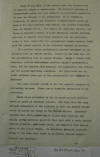
|
4.
13 July 1927.
"Trade Promotion Work At Bluefields"
(No. 181), Report by
US Consul A. J.
McConnico, Bluefields, p. 4.
" . . . Fully 85
percent of the imports into the district
are of American origin or manufacture.
The district produces no manufactured
goods; nor food products in sufficient
quantities to meet the demands of the
population. It is compelled,
therefore, to import all varieties of
manufactured goods and most of the food
products from abroad, the greater
proportion from the United States.
The annual and quarterly reports, and
those on concrete results of trade
extension contain sections relating to
imports from other countries and the
preference given to them, especially the
supplemental annual reports based upon
the annual reports of the Collector
General of Customs. ¶ No
countries enjoy preferential customer
treatment in the district over the
United States. France at one time
did, but the preferential rate no longer
obtains. Under a treaty with
Honduras, certain Honduran products
enjoy a preferential rate, but the
imports from Honduras are negligible,
not affecting the larger exporting
countries. The Department was no
doubt informed years ago of the
preferential rate enjoyed by Hondurans.
¶ The local customs tariff is for
the specific purpose of collecting
revenue. There are no domestic
industries to be protected. ¶
There is no prejudice in the district
against American goods or American
business methods. The fact that
the only steamer connection of the
district is with the United States tends
to direct all trade to the United
States. Importers realize that
their orders can be filled more quickly,
and readily prefer American products
that meet with a ready demand.
Certain products, mentioned above, are
imported from Europe owing to the local
demand. In obtaining European products
owing to the fact that there is no
direct steamer service, delays are
frequent. ¶ The . . . "
|
|
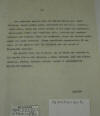
|
5.
13 July 1927.
"Trade Promotion Work At Bluefields"
(No. 181), Report by
US Consul A. J.
McConnico, Bluefields, p. 5.
" . . . The
principal imports from the United States
are: Food products; staple cotton goods;
machinery for saw mills, railways, sugar
mills, mines and other classes of
machinery and electrical appliances;
paints and varnishes; oils, gasoline and
kerosene; hardware and cutlery; drugs
and chemicals; shoes and leather goods;
paper and paper products. These
constitute approximately 85 percent of
the imports into the district and are
valued at $2,000,000 annually. ¶
The exports from the district, all of
which are absorbed by the United States
are: Mahogany, cedar, bananas, gold and
alloys, coconuts, rubber, turtles,
silver, valued at approximately
$3,000,000 annually. ¶
BANKING . . . "
|
|

|
6.
13 July 1927.
"Trade Promotion Work At Bluefields"
(No. 181), Report by US Consul A. J.
McConnico, Bluefields, p. 6.
" . . . BANKING
INSTITUTIONS. ¶ The one
banking institution of the district, a
branch of Banco Nacional de Nicaragua
with headquarters at Managua, is located
at Bluefields. It buys and sells
exchange on New York and New Orleans at
one-fourth of one percent, and makes
collections for one-half of one percent.
The rate of interest usually demanded is
12 percent, but higher rates varying
from 18 to 24 percent are demanded by
individuals. According to the
estimate of the local bank, 200,000
cordobas and 100,000 American dollars
are in circulation in the district.”
(Annual Report for 1926, Page 6,
forwarded to the Department on March 26,
1917.) ¶ The growing
importance of Puerto Cabezas as a port
and as a center for the importation and
distribution of merchandise and the
exportation of bananas and pine lumber
warrants the establishment of a banking
institution there. The large
circulation of American currency in the
district is due to the fact that the
Bragmans Bluff Lumber Company at that
port finds it necessary to import
American currency to carry on its
operations, there being no banking
facilities in that section of the
district. ¶ The banking
facilities at Bluefields are sufficient,
and trade conditions do not warrant the
establishment of another institution.
¶ Information as to the lack of
banking facilities at Puerto Cabezas was
given in the following reports: Annual
Report for 1925, forwarded March 31,
1926; Quarterly Report for March, 1926,
forwarded April 13, 1926; and Quarterly
Report for June, 1926, forwarded July
10, 1926. ¶ There are no
local laws or regulations discriminating
against American Banks. As a
matter of fact Banco Nacional de
Nicaragua is dominated by American
interests. ¶ TRANSPORTATION
. . . "
|
|
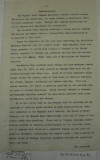
|
7.
13 July 1927.
"Trade Promotion Work At Bluefields"
(No. 181), Report by
US Consul A. J.
McConnico, Bluefields, p. 7.
" . . .
TRANSPORTATION. ¶ The
Cuyamel Fruit Company maintains a weekly
service between New Orleans and
Bluefields, its ships sailing at
Cienfuegos, Cuba, on their southbound
trips. Through this company
practically all of the imports into
Bluefields are transported. ¶
The Standard Fruit Company maintains a
15-day service between New Orleans and
Puerto Cabezas, transporting such
merchandise at is demanded at that port.
¶ These two companies are the only
ones connecting the Bluefields Consular
District with the outside world.
They maintain their services primarily
to return with cargoes of bananas to the
United States, engaging in freight and
passenger service from New Orleans as a
mere side issue. Their ships are
of Nicaraguan and Honduran registry.
¶ The Munson line provided ships
during the last mahogany season ended
June 20, 1927, as such periods as
demands were made for exporting mahogany
and cedar logs. About 30 of this
company’s ships called during the
season, nine of them being of American
registry, the others, English, Norwegian
and Danish registry. This was
rather unusual, for ships of American
registry do not usually sail at ports of
eastern Nicaragua. Small coastal
vessels of Panama and Honduras registry
connect the Bluefields district with
ports of Honduras, Costa Rica and
Panama. ¶ It is not likely
that an opportunity will be afforded for
an increase of American participation in
such transportation, when such companies
as the Cuyamel Fruit Company, the
Standard Fruit Company, and the Munson
Line deliberately make use of ships of
registry other than American.
There are no foreign shipping
combinations hostile to American
participation in the carrying trade, but
it appears that there is a concerted
demand on the part of American interests
controlling the export trade of the
district to employ ships of foreign
registry, possibly because the
operations costs are less. ¶
The American . . .
|
|
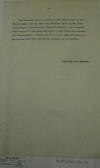
|
8.
13 July 1927.
"Trade Promotion Work At Bluefields"
(No. 181), Report by
US Consul A. J.
McConnico, Bluefields, p. 8.
"The American
ships, as well as the other ships of the
Munson Line, arrived from such American
ports as New York, Philadelphia, New
Orleans, always in ballast, and returned
with cargoes of mahogany and cedar to
New York, New Orleans, and Philadelphia.
During the past fiscal year the American
proportion was about one third, usually
it is nothing. ¶ CHAMBERS OF
COMMERCE . . . "
|
|
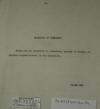
|
9.
13 July 1927.
"Trade Promotion Work At Bluefields"
(No. 181), Report by
US Consul A. J.
McConnico, Bluefields, p. 9.
" . . . CHAMBERS
OF COMMERCE. ¶ There are no
chambers of commerce, boards of trade,
or similar organizations in the
district. ¶ TRADE AND . . .
"
|
|
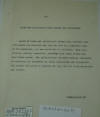
|
10.
13 July 1927.
"Trade Promotion Work At Bluefields"
(No. 181), Report by
US Consul A. J.
McConnico, Bluefields, p. 10.
" . . . TRADE AND
STATISTICAL PUBLICATIONS AND CATALOGUES.
¶ American Trade and statistical
newspapers, review, and catalogues are
received and kept on file in a separate
room of the consulate, and are available
to visitors. They are, however,
seldom consulted, possibly five times
within the past three years. The
publications are made readily available
to visitors for reference by being
classified and segregated. Old
issues are given to persons who may ask
for them; merchants and others. ¶
PREPARATION OF . . . "
|
|
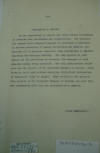
|
11.
13 July 1927.
"Trade Promotion Work At Bluefields"
(No. 181), Report by
US Consul A. J.
McConnico, Bluefields, p. 11.
" . . .
PREPARATION OF REPORTS. ¶ In
the preparation of reports and trade
letters information is obtained from
individuals and organizations. For
instance the Cuyamel Fruit Company’s
manager is consulted in reference to
sections pertaining to banana
cultivation and exports; the managers of
the mahogany companies, when information
is desired regarding the mahogany
industry. The same applies to gold
mining and the production of coconuts,
the managers of such concerns always
being consulted. The only
publications relied upon are the reports
of the Collector General of Customs,
there being no local publications
supplying statistical information of
commercial value or weight. When
statistics and excerpts from reports of
the Collector General of Customs are
used they are accompanied with full and
interpretative comments. ¶
TRADE COMPLAINTS . . . "
|
|
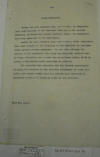
|
12.
13 July 1927.
"Trade Promotion Work At Bluefields"
(No. 181), Report by
US Consul A. J.
McConnico, Bluefields, p. 12.
" . . . TRADE
COMPLAINTS. ¶ During the
past calendar year, and to date, no
complaints have been received at the
consulate from any of the foreign
merchants of Bluefields against American
firms. No complaints have been
submitted to the Department. ¶
During the past calendar year, and to
date, three complaints have been brought
to the attention of the consulate by
American firms against foreign
merchants. In one case, through the
efforts of the consulate, the claim was
adjusted; another case is being
litigated; and a third was an outlawed
claim which no lawyer of Bluefields
would undertake to collect. ¶
The consulate has therefore had but
limited opportunity in using its
services in the amicable settlement of
trade disputes; and cannot assert that
its efforts have resulted in increased
prestige to American trade in the
district."
|
|
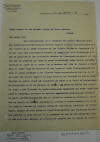
|
1.
1 August
1927.
Letter from Leónidas Segundo Mena,
Abogado, Bluefields, to
US Consul A. J.
McConnico, Bluefields, p. 1.
"Señor Consul de
los Estados Unidos de Norte America
¶ Ciudad ¶ Muy señor
Mio: ¶ Con instrucciones de
mi mandante don Albert Fagot, de quien
soy apoderado generalísimo, me permite
exponer a Ud lo siguiente, para que sea
trasmitido al señor Ministro de los
Estados Unidos en Managua, a fin de que
este algo funcionario conozca la queja –
que ante él, hace, por falta de justicia
en los tribunales comunes de Nicaragua,
respecto a un juicio que le promovió por
suma de pesos córdobas, el señor Carlos
Hernalde Ibarra, en el lugar de su
domicilio, la Comarca de Cabo Gracias a
Dios. Ante el señor Juez de Distrito de
ese lugar, el señor Ibarra, demandó por
suma de pesos córdobas a don Alberto
Fagot, representante que fue de la
Sociedad “The Albert Fagot & Co.”
Cuya demanda fue iniciada el año de
1925. Fallado el juicio llegó por
apelación de Fagot a la Corte de
Apelaciones de Bluefields el 27 de
febrero de 1926 --- Me presentó dentro
del termino legal a ese Tribunal de
Apelaciones, como apoderado del señor
Fagot, mejoré el recurso, y presenté mi
escrito expresando agravios, que
contestó la parte contraria, quedando
asi el juicio en estado de sentencia.
En el mes de agosto de 1926, me pusieron
en prisión é incomunicado, y asi, no me
fue posible atender en ninguna forma mis
asuntos, en cuenta, el de Mister Fagot.
Estuve 59 dias preso en Bluefields,
durante los cuales, no me dieron permiso
ni para asistir a la gravedad de una de
mis chiquitas, pero ni una sola vez.
Estando en prisión, me sacaron por la
fuerza de Blue-- . . . "
|
|
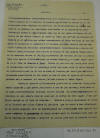
|
2.
1 August
1927.
Letter from Leónidas Segundo Mena,
Abogado, Bluefields, to US Consul A. J.
McConnico, Bluefields, p. 2.
" . . . fields,
embareandome inesperadamente, en dos
minutos, sin ropa y sin despedirme
siquiera de mi familia. Ya ausente
yo, fallaron el asunto de mi
representado señor Fagot, en su centra,
el dia 30 de Noviembre de 1926, a las
diez de la mañana, y por gestiones
continuadas de la contra-parte señor
Ibarra, que andaba en ese entonces como
uno de los jefes militares del Gobierno
de don Adolfo Diaz, en el vapor el “Leon
del Mar”. Me notificaron por
esquela en mi oficina que estaba
cerrada; pero al tener noticias de esa
esquela en mi esposa, se le comunicó a
mi hermano, el señor Notario Publico don
Julio C. Mena, (de filiacion
conservadora) quien inmediatemente y
dentro del termino legal, interpuso como
agente oficiosos de don Alberto Fagot,
recurso de casacion contra el fallo,
expresando los motivos por que se
presentaba como agente oficioso; pues yo
estaba ausente, y el señor Fagot reside
en el Cabo de Gracias a Dios. Viende la
justicia del hecho, ésta Corte de
Apelaciones admitió el recurso, y envié
los autos ante la Corte Suprema de
Justicia, la cual no le dio entrada al
recurso, por decir: que habiendo
apoderado constituido en los autos, no
era el caso de agencia oficiosa,
negandose asi, a conocer del asunto
fallado contra el señor Fagot. ¶
Ahora, la Agencia oficiosa, esta
permitida en nuestros leyes, para casos
urgentes y que paren perjuicios a uno de
las partes; y sino cabe en el caso
presento? cuando entonces tendra cabida?
Yo, estaba ausente, pues el Gobierno de
don Adolfo Diaz me sacó por la fuerza de
esto lugar. Y don Alberto recide
en el Cabo de Gracias.- Debido a este, y
observando mi hermano el Notario don
Julio C. Mena el perjuicio que le venia
a don Alberto, si no se pedia casacion
ante la Suprema, obtó por presentarse
como agente oficioso conforme lo
prescribe la ley; y aunque aqui le
tuvieron como tal- La Corte Suprema lo
rechaza y devuelve el juicio para que se
ejecute la sen- . . . "
|
|
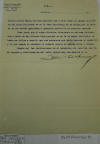
|
3.
1 August
1927.
Letter from Leónidas Segundo Mena,
Abogado, Bluefields, to US Consul A. J.
McConnico, Bluefields, p. 3.
" . . . -tencia
contra Fagot,- Lo cual, equivale
que a este señor le saquen su dinero del
bolsillo, porque no se lo hace justicia,
y se lo obliga, por la fuerza de los
hechos apuntados a pagar; sin admitirle
su completa defensa. ¶ Creo
justo que el señor Ministro interponga
su valiosa influencia a favor de don
Alberto Fagot, porque no se le ha hecho
justicia, y de hecho se obliga a cumplir
con una sentencia que tenia recurso de
casacion; y le fue negado, no obstante
de haberlo puesto en debida forma y
tiempo. ¶ Cumplo asi las
instrucciones de mi mandante, y me
suscribe con todo respeto y
consideracion, del señor Consul, muy
atentamenta S.S. ¶ (signed)
Leónidas S. Mena"
|
|
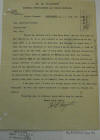
|
5 August
1927.
Letter from H. E. Fagot, Puerto Cabezas,
to US Consul A. J. McConnico,
Bluefields.
"Please be
advised that I was born 22nt. day of
July 1881 in New Iberia La. U. S. A. and
resided in the United State up to the
year 1909. I am therefore an American.
And whereas it seems that I have not had
due proction (sic) in this Country as an
American, I wish to state that, on the
19th. day of July 1927, three thieves
entered my store and stole from me
upwards of $3600.00 and that the thieves
have confest to the Comandante of this
Port, having stollen my money, however
it seems that no sever measures have
been used on the part of the authorities
to compell the thieves to return the
stollen money as I have prosecuted the
parties, and they are going to be sent
to Bluefields for trial, would be
greately oblige to you if you would
kindly take such steps, as to compell
them to return the money. ¶
I am sure that if they are being turned
over to the American Comander, he will
use sever measures to compell them to
return the money. ¶ Thanking
you in advance, mean while beg to
remain, ¶ Yours very truly.
¶ (signed) H. E. Fagot"
|
|
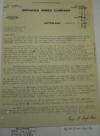
|
8 August
1927.
Letter from George A. Napoleon, Neptune
Mine, to US Consul A. J. McConnico,
Bluefields.
"Dear Sir:
¶ Mr Warnick left here July 9th
for the States. His reason for going he
told me was to procure the necessary
supplies and foodstuff which Mr.
Springer refused to send. Mr
Springer has a contract (see mining
code-Aviador) to furnish mine with
foodstuff and supplies. ¶ Mr
Warnick left me in full charge of the
mine and its affairs. He
instructed me to send bullion to Mr
Springer and to pay Mr Springer's
account. Mr Springer has now sent
Mr Skaling to take over this property
and affairs without sending me a court
order, or the courtesy of a letter,
neither has he sent money to liquidate
the labourers. Mr Skaling has
brought two thousand dollars to pay for
work that laborers will do for him after
he has received the property from me.
When Mr Warnick left here he instructed
me to get what foodstuff and supplies I
could around here and if money did not
come in I was to settle with gold.
¶ Mr Skaling came here with Mr
Springer's brother in law who is to act
as Police Inspector and forcibly if
necessary take over the mine and turn it
over to Skaling. Skaling states
that Mr Springer has been appointed
receiver by Court but he has no
documents with which to prove it here.
¶ I will deliver the mine and
affairs of Bonanza Mines Company to him
if forced to by the Police Inspector,
under written protest, or upon him
presenting me with proper papers.
I am bringing this to your attention so
as to protect myself from all
responsibilities. ¶ There is
a Chinese merchant in Tunky who came in
yesterday to find out what was going on.
He had been notified to do so but Juan
Pong of Sun Hing Long, Bluefields, they
are one of the largest creditors of the
Company and although Mr Springer had
stated to others that he had been
appointed “Interventor” by creditors
(Juan Fong) knew nothing about it.
¶ I cannot understand if Mr
Springer is acting under his Aviador's
contract, as Power of Attorney of the
Company, or for some other interest. ¶
As this is American property I would
like for you to look into the matter so
as to avoid as much litigation as
possible, and I do not want to be the
goat. Trusting you will give the
matter your consideration I am, ¶
Yours very truly, ¶ (signed)
George A. Napoleon"
|
|
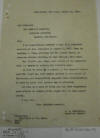
|
10 August
1927.
Letter from US Consul A. J. McConnico,
Bluefields, to C. Eberhardt, US
Minister, Managua.
"I am
transmitting herewith a copy of a
complaint received at this consulate on
August 1, 1927, from Dr. Leonidas S.
Mena, attorney for Mr. Albert Fagot, an
American citizen residing at Cape
Gracias, Nicaragua. ¶ Mr.
Fagot's son, Hugh, also called at the
consulate with the lawyer to explain his
father's case. ¶ As will be
noted by a perusal of the lawyer's
statement Mr. Fagot has been denied
justice in the courts of Nicaragua, and
respectfully requests that
representation be made in order that
justice may be obtained. ¶
If this is a case of which you can take
cognizance your efforts in behalf of Mr.
Fagot will be much appreciated."
|
|
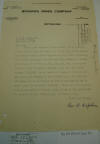
|
14 August
1927.
Letter from George A. Napoleon, Neptune
Mine, to US Consul A. J. McConnico,
Bluefields.
"Dear Sir:
¶ Kindly have enclosed letter
mailed to Mr. Warnick, I have not yet
made the turn over of the mine to Mr
Skaling who Springer sent, I would
appreciate your advise regarding the
matter. Springer's account has been
materially reduced with shipments of
bullion, No. 137, 138, 139. His
account to June 30 was $16.000. bricks
No. 137, 138, 139 should produce
$15,000. He no doubt will charge
all that he is now sending to Skaling on
the account which will increase it
again, but as he refused to send us
supplies he has no right under his
Aviador's contract. These are only
pointers I am giving you as I consider
your advise in the matter will be
valuable to me. ¶ Thanking
you in advance I am, ¶ Yours
very truly, ¶ George A
Napoleon"
|
|
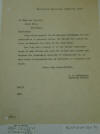
|
15 August
1927.
Letter from US Consul A. J. McConnico,
Bluefields, to Wo Hing & Comnpany, Cukra
Hill, Nicaragua, p. 1.
"Gentlemen:
¶ Your claim against the
Nicaraguan Government for the
destruction of property during the
recent revolution was taken to Managua
last week by Mr. Juan Pong. ¶
Mr. Pong will present it to the Claims
Commission which is now sitting and upon
his return will inform you whether the
Commission approved or disapproved it,
or what other requirements may be
necessary to complete your claim.
¶ Yours very respectfully, ¶
A. J. McConnico. ¶ American
Consul."
|
|
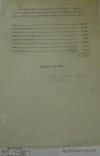
|
15 August
1927.
Letter from US Consul A. J. McConnico,
Bluefields, to Wo Hing & Comnpany, Cukra
Hill, Nicaragua, p. 2.
"Personal effects
and property of TIO WONG, a Chinese
citizen, which were taken forcibly by
the Liberal troops at Bilway, Nicaragua,
near Puerto Cabezas, on January 26,
1926. ¶ Cash $323.00 ¶
3 Suits Clothes $85.00 ¶ 6
Shirts $16.00 ¶ Blankets and
bedding $15.00 ¶ 1 Pair
Shoes (new) $7.00 ¶ 1 Trunk
$12.00 ¶ 1 Watch $8.00
¶ 1 Gold Ring $16.00 ¶
$482.00 ¶ (Signed) TIO
WONG."
|
|
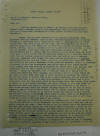
|
1.
17 August
1927.
Letter of Henry Spears, Puerto Cabezas,
to Jefe Político Juan J. Estrada, with
copy & cover letter to US Consul A. J.
McConnico, Bluefields, p. 1.
"Dear Sir:
¶ I enclose herewith copy of
letter I am sending to the Jefe
Politico, General Juan J. Estrada, which
is self explanatory, with the exception
that I give you a little more
information as to the parties referred
to in that communication. ¶
Bordas, was appointed Governor of Cape
Gracias in November, 1925, by General
Emiliano Chamorro, after he had
overthrown the government. He
having a sawmill in partnership with a
German by the name of John Asmussen, he
forced Indians who I had cutting logs
from my lands, and for which they had
received advance amounting to over
$3,000.00, to bring the logs down to
himself and Asmussen making it
impossible for me to get hold of my
property or collect my accounts, until
after peace was established, at which
time, I, with the authorities and Mr.
Bordas, made an inspection of his lumber
yard, and there found quite a lot of
lumber with my registered brand on it.
I also have declarations from the
Indians themselves stating that they
sold my logs to Asmussen. I at
once embargoed (secuestrado) the logs,
and was appointed the receiver
(depositario) for the logs and lumber,
amounting to some 400,000 feet, and
after the arrival of the present
Governor, he has permission Asmussen,
without my knowledge or consent, to ship
out considerably over 30,000 feet of
this lumber, thereby doing nothing less
than stealing my property the second
time. I am, legally, held responsible
for the entire amount on the yard and
also that which has been shipped.
Bordas and Asmussen, both of whom are
mixed up in family with the indians and
understand their language, also having a
member of mixed breeds who are ready to
serve them, have made it their business
to intercept the indians who are now
trying to deliver logs to me to pay my
accounts and advising them that all they
have to do is to deny their accounts to
the Governor and he will force me to
turn the logs loose, which he has
already done. The indians being
unable to write, it is the custom
throughout the entire country to give
them credit or advance for work they
agree to perform without any documents
of any nature. I have worked
mahogany camps and managed mahogany
companies for the past 14 years,
investing many millions through Mexico
and all Central America and know their
customs well, all of which can be
verified by any mahogany man in this
country. The Governor to have a
subterfuge behind which to hide, asked
me for accounts or other documentary
evidence to prove my account, and not
being able to give this, forced me to
deliver the logs back to the indians.
¶ I have had this matter up
through Lt. Connette here, and he has
assured me that he had referred it to
the Commander, but this being over a
week ago, and not having received any
news, I have decided to put the matter
before the authorities and your good
offices, hoping for some relief.
This is positive, I expect to return to
the Cape about next Tuesday, the 23rd
instant, and feel sure that if the
Governor has not received instructions
in this matter that he is going to try
to permit further abuses and insults and
robberies, and will be met with the
proper material to defend my family,
myself and my property. It is
impossible that I stand by and look on
such malicious, criminal and cruel
abuses and insults. ¶ In the
first place, the Governor is nothing but
a very low type of drunkard, this can be
proven by inquiring of any reliable
person in Bluefields. I will not .
. . "
|
|
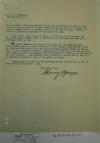
|
2.
17 August
1927.
Letter of Henry Spears, Puerto Cabezas,
to Jefe Político Juan J. Estrada, with
copy & cover letter to US Consul A. J.
McConnico, Bluefields, p. 2.
" . . . go into
detail over these matters, but you can
investigate and find out that it is not
wise to live in the same community with
this class of person. Instead of
protecting, he is trying to kill.
If he remains there, I will be forced to
abandon my business, for the moment at
least . ¶ I may mention here, that
the lands I control are not in my name,
but are in the name of people who I
represent, and are in perfect order and
in conditions with the law. ¶
Dr. Onofre Sandoval, who has been my
lawyer for the past ten years will be
glad to give you any information on this
subject. I am writing to him to
look into this matter to try and save me
further losses. During the
revolution, I have receipts for several
hundred dollars that they took from my
store, both sides, no doubt, by
necessity, but nevertheless, is
represents a big loss to me in my
business. I am preparing these
receipts to present them to see if it is
possible to recover a part of the
amount, at least. ¶ Trusting
that you will see the influence of your
good offices to give me some relief in
this matter, I am, Very truly yours, . .
."
|
|
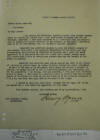
|
3.
17 August
1927.
Letter of Henry Spears, Puerto Cabezas,
to Jefe Político Juan J. Estrada, with
copy & cover letter to US Consul A. J.
McConnico, Bluefields, p. 3.
"My dear Doctor:
¶ I am writing Mr. McConnico,
American Consul, also General Estrada
about the abuses and insults that I have
been forced to accept from the new
Governor, Salavarri. I have also
mentioned to Mr. McConnico that you
would be glad to explain the entire
situation to him relative to the lands I
represent, also as to the confessions,
etc. in my matter against Asmussen.
¶ Salaverri has permitted Asmussen
to ship out several cargoes of pine
lumber, even after I was appointed
depositario of the lumber and logs
secuesrados, even without my knowledge
or consent, and I certainly would
appreciate it if you would see both the
Consul and General Estrada about this
matter with a view of having some
changes made for the benefit of the
public in general. ¶
Salaverri has committed many crimes
against me, even to the extent of
entering my private home, by force,
breaking through the gates, shooting at
some of the crew of my schooners, being
drunk and raising a scandal in general.
Is openly against me and my interests,
illegally and criminally, and for the
protection of my family, self and
property, I feel sure that something
should be done. I have asked the
American Consul to consult with the
reliable people of Bluefields in order
to get the facts as to the personal
character of this young man they have
appointed as Governor of the Cape.
¶ I expect to sail from here about
Tuesday for the Cape, and if you can
assist me, I will certainly appreciate
if very much. ¶ With kindest
regards, and assuring you of my
appreciation, I am, ¶
Sincerely yours, . . . "
|
|
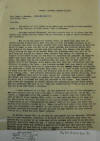
|
4.
17 August
1927.
Letter of Henry Spears, Puerto Cabezas,
to Jefe Político Juan J. Estrada, with
copy & cover letter to US Consul A. J.
McConnico, Bluefields, p. 4.
"Dear Sir:
¶ The motive of this letter is to
advise you of conditions that actually
exist in Cape Gracias, at which place I
have a business. ¶ Governor
Antonio Salaverri, who was presently
sent to the Cape, has committed many
crimes against myself and my interests,
a part of which consists of the
following: ¶ The second day
after his arrival there, at which time I
was here in Puerto Cabezas looking after
some business, he sent two armed
policemen up to my sawmill, just above
the Cape, knowing that there was no one
except my daughter about 17 years of
age, and who cannot speak Spanish, and a
little native girl who works at the
house, present when they arrived, Mrs.
Spears with the baby being down at the
Cape on an errand. These two
policemen went on a raft of my pine logs
and started to measure them without even
having the courtesy to inquire at the
house if anyone was there to represent
the premises. My daughter asked
them their business and was informed
that they were there to measure my logs,
she asked them to not interfere with the
logs, but to wait until I returned from
Puerto Cabezas, their answer what that
they had instructions from the Governor
to measure the logs, she insisted that
they should not touch the logs, and
finally when one of them stuck out his
tongue at my daughter she presented a
rifle and demanded they leave, one of
them reached for his pistol at which
time she drew this rifle and demanded
that he do not touch his pistol, they
finally left. The Governor
afterwards came up with several other
men, none of whom were armed that could
be seen, except the Governor had a
pistol under his shirt, and after trying
to measure the logs, they were finally
convinced that it would not be allowed
and they too returned to the Cape.
Mrs. Spears at once wired the Commander
at Puerto Cabezas for protection against
these abuses, and the Destroyer 314 went
to the Cape and instructed the Governor
not to send anyone to my mill until I
returned. ¶ I later returned
to the Cape and was requested to come to
the Gobernacion and was informed that an
indian had made a complaint against me,
which was, of course, a conspiracy among
the enemies of mine. I showed that
the indian had owed me $11.70 since
January 1925, which had been advanced
him to cut logs for me. His
brother delivered the logs to me, had me
measure them and one of his indian
women, at his request, placed my hammer
brand on the logs, but after consulting
with certain enemies at the Cape, he
would not receive the money for the
logs, nor acknowledge the account of his
brother, the owner of the logs.
The Governor accepted his denial against
my word and ordered the logs removed
from my mill, which was done under
protest. ¶ On Monday, August
6th, he refused to sign papers for the
Schooner WINFIELD for no reason
whatever, resulting in my holding the
schooner over there for another day on
account of my knowledge of his refusal
only came to me when the schooner was
being towed out and I had to have it
returned with a tow boat to my wharf at
my store and residence down at the Cape
Bar. The schooner being anchored
about 12 feet from my wharf on account
of shallow water in the river, the crew
used the schooner’s [doing] as a means
of going on my private wharf . . . "
|
|
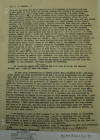
|
5.
17 August
1927.
Letter of Henry Spears,
Puerto Cabezas,
to Jefe Político Juan J. Estrada, with
copy & cover letter to US Consul A. J.
McConnico, Bluefields, p. 5.
" . . . from the
schooner. The wharf leading from
the sidewalk is fenced in and has a gate
which is kept locked to prevent persons
from entering my private home.
This night there was a negro dance given
at the cantina of a negro Nathan Cole,
his place being in close proximity to my
house. The Governor along with several
others attended the dance, became drunk
and abusive, after the crew on the
schooner Winfield left and entered my
wharf, locked the gate and went aboard
the schooner to sleep. The
Governor was making a great scandal in
the street, cursing, and flourishing his
pistol, telling everybody that they had
better go to sleep. One of the
crew on board said something to someone
about the scandal, without knowing who
was actually doing it, the result was
that the Governor called out from the
sidewalk in front of my gate that he was
the Governor and he did not want to hear
another word out of any D------ S-- of a
B-----, he then without further words,
fired his pistol at the boat, the bullet
passing through the gate post, where the
hole still remains, after which he broke
through my gate by force, tearing down
the boards, and on board of the
schooner, found one of the crew in the
cabin, and began beating him over the
head with his pistol, (blood still being
on the floor of the cabin, and in the
doorway) then forced the negro to go
ashore, a regular stream of blood
dropping along my private wharf, took
him to jail, locked him up, left him
there with the result that in the
morning the negro had lost so much
blood, he could hardly walk. He
finally called the negro from the jail
to see how badly he was hurt, and told
him to go, without placing any fine on
him, which shows clearly that the negro
had not committed any crime to justify
such treatment. His head above his left
eye was broken for about 2 inches, (the
skin, of course) his left cheek bursted,
his fingers on one hand brusted,
evidently by trying to protect his head
from the assault of the Governor, his
arms bruised considerably. ¶
He signed my papers that morning and
sent them to me by the Customs Broker,
and I have not seen him since. ¶
He has given instructions to permit
lumber shipped out by Mr. Asmussen,
which lumber had been secuestred by me
and I am still depositario for the
lumber and this is a criminal act on the
part of the authority. The fact,
as it stands today is as follows: After
finding my lumber, with my registered
brand on the ends of the pieces in the
possession of Asmussen and Bordas (in
their lumberyard) Mr. Bordas admitted it
was mine; that he had bought it from
some indians. His confession is a part
of the documents now in the hands of the
local Judge at the Cape. The
District Judge, Sr. Diaz has been at the
Cape several days when I left there for
this place on a business matter, and up
to that time the Local Judge, who I
understand is the father of the
Governor, had not delivered to him the
documents or papers in the matter of
this secuestration, and after I left I
received a cable from Mrs. Spears, which
reads as follows: “Asmussen shipping
your lumber”, showing that they were
just waiting until my departure to
commit this robbery. I have never
been advised that the secuestration has
been raised, and know of no such act,
and can only come to the conclusion that
the Governor is permitting Asmussen to
ship out my lumber illegally, and which
in effect, is nothing more than robbery.
¶ I am sending a copy of this
complaint to the American Consul in
Bluefields, and feel sure that you will
give me some relief or guarantee for not
only my property, but for the life of
myself and family. At this moment,
I have none, all of which is shown by
the above statement, which I can verify
at any time you feel disposed to send a
representative to investigate. ¶
Assuring you that I deeply regret to
find it compulsory to make this
complaint, I am, ¶ Very
truly yours, . . . "
|
|
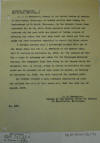
|
22 August
1927.
Statement of US Consul A. J. McConnico,
Bluefields, re recent civil war & 3
merchant ships inabilty to load logs in
Bluefields harbor from Sept. 10-20,
1926.
"I, A. J.
McConnico, Consul of the United States
of America at Bluefields, Nicaragua, do
hereby certify that during the
bombardment of El Bluff, Nicaragua, by
the Liberal forces from September 10, to
20, 1926, three merchant ships arrived
and anchored off the port with the
object of taking cargoes of mahogany and
cedar, but that they could not enter nor
take any cargo and were therefore
compelled to depart for other ports.
¶ I further certify that I
afterwards learned that one of the three
ships was the S. S. MUNARDAN of the
Munson Line; that it arrived on
September 11, 1926, for the purpose of
taking a cargo of mahogany and cedar for
the Nicaragua Mahogany Company, the
company’s logs then being in the lagoon
ready for shipment; but, as stated,
owing to actual hostilities the ship
could not be entered and no logs could
be loaded, so finally on September 16,
1926, the ship departed for another
port. ¶ IN WITNESS WHEREOF I
have hereunto subscribed my name and
affixed the seal of this consulate, this
the 22nd day of August, 1927. ¶
A. J. McConnico, ¶ Consul of the
United States of America at Bluefields,
Nicaragua."
|
|
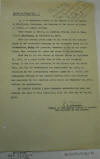
|
23 August
1927.
Statement of US Consul A. J. McConnico,
Bluefields, re death of Vernon L.
Childs, US citizen, in Bluefields, 6
Sept. 1927.
"I, A. J.
McConnico, Consul of the United States
of America at Bluefields, Nicaragua, and
Executor of the Estate of VERNON L.
CRILLS, do hereby certify: ¶
That Vernon L. Crills, an American
citizen, died in Bluefields, Nicaragua,
on September 6, 1927; ¶ That
for several years prior to his death he
had been engaged in the mercantile
business on the Escondido River and its
tributaries, using the gasoline
houseboat LA OLA as his storehouse, thus
carrying his goods and wares to his
customers; ¶ That the LA OLA
was seized by Liberal forces on
September 11, 1926, at a point called
Loma de Nico on the Escondido River, as
the boat was returning to Bluefields
from its usual trip, and all the
merchandise was confiscated and used, as
evidenced by the accompanying vouchers
signed by K. DUARTE, the Commanding
Officer of the Liberal forces; that said
houseboat was recovered by the American
naval force on September 14, 1926,
without the merchandise. ¶
IN WITNESS WHEREOF I have hereunto
subscribed my name and affixed the seal
of this consulate, this the 23rd day of
August, 1927. ¶ A. J.
McConnico, ¶ Consul of the
United States of America and Executor of
the Estate."
|
|
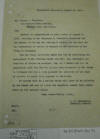
|
25 August
1927.
Letter from US Consul A. J. McConnico,
Bluefields, to Mr. George A. Napoleon,
c/o Bonanza Mines Company, Neptune Mine.
"Sir: ¶
Receipt is acknowledged of your letter
of August 6, 1927, relating to Mr.
Benjamin C. Warnick’s departure for the
United States and Mr. Skaling’s arrival
at the mine and his assumption of duties
as manager at the instance of Mr. Henry
F. Springer. ¶ You are fully
protected under the law by delivering
the management of Mr. Skaling under
protest. Mr. Skaling’s assumption of
duties as manager, is, as I understand
it, in conformity with the law for he
has been delegated by Mr. Henry F.
Springer who has a lien against the
products of the mine to operate it until
full payment is received. ¶
Of course this is a matter which will
have to be adjusted by the Court and one
of which the Legation cannot take
cognizance in its present stage. ¶
Very respectfully yours, ¶
A. J. McConnico, ¶ American
Consul."
|
|
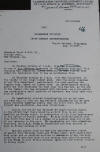
|
27 August
1927.
Letter from
C. L. Veitch,
Manager, Bragmans Bluff
Lumber Company,
Puerto Cabezas, to Standard Fruit
Foreign Dept, New Orleans, p. 1.
"Gentlemen:
¶ On Tuesday morning at 1 A.M.,
fire was discovered in one of our
laborers baracones in the Spanish
section. This building was
completely burned down and at that time
we were under the impression that it was
an accidental fire. ¶ On
Thursday morning at 2 A.M., fire was
discovered on the inside of our rough
lumber shed. Only the quick
response of our fire department,
particularly the crew handling the
foamite tank, saved our lumber shed.
An investigation shortly after the fire
developed the fact that this was set, as
the end of the lumber pile was saturated
with kerosene, as a one gallon can
containing a small quantity of kerosene,
was found near this pile of lumber.
¶ We immediately started
investigating but as yet have not been
able to find out any definite
information but we have since received
numerous rumors that the first fire,
which we thought was accidental, was
also intentional. ¶ During
the entire day Thursday we heard various
rumors to the effect that there would be
a third fire in all probability as
Friday night, in celebration of the
first anniversary of the battle of
Puerto Cabezas. We also received
advice that this third fire was to be a
signal of a general walk out of all of
our laborers in the port We immediately
got into communication with the U.S.S.
TULSA at Bluefields and they arrived in
port on Friday morning at 9:30. ¶
Special guards from our American
employees were placed on patrol duty
Thursday night and Friday night.
Both nights were very quiet and no
peculiar actions or movements of any one
were noted but we are very much of the
opinion that only the arrival of the
TULSA in port Friday morning, saved us
from further trouble on Friday night. .
. . "
|
|
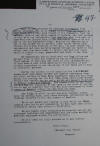
|
27 August
1927.
Letter from
C. L. Veitch,
Manager, Bragmans Bluff
Lumber Company,
Puerto Cabezas, to Standard Fruit
Foreign Dept, New Orleans, p. 2.
" . . . Late
Friday afternoon we received information
from Father Grossman, who is in charge
of the Moravian Mission at the place and
a very good friend of the company’s,
that two Indians, whom he had every
reason to believe, had just arrived in
port with the information that Sandino's
army or a part of same were now located
back of our Aubreyerri Farm or at the
end of the old Aubreyerri Trail, waiting
for Sandino and a few of his picked men
to arrive, these latter having gone
through the mining district in Pis Pis.
He also stated that information had been
secretly passed through our farms to the
effect that they were ready to recruit
men and that there would be plenty of
guns, ammunition and money to pay them.
¶ We immediately got in touch with
our Vava office and advised them to send
out runners as far as the Aubreyerri
Trail and see if there was any truth in
this information and to also keep a very
close watch as to the arrival of
auspicious characters or new men on any
of our farms and to keep us constantly
advised. ¶ During the
cutting of the cargo for the S.S. KOSMOS
we experienced some small strikes and
passive resistance from our fruit
cutters on Vava Farm, Aubreyerri Farm
and Yulu Farm. During the cutting
for the S.S. VAVA these three farms
worked without any trouble but we had a
strike and passive resistance on Tungla,
Limos and Vakiwas. The reason
given by the fruit cutters was the
reduction we had made in the price of
cutting but it may be possible that this
was also encouraged by these rumors of
Sandino coming this way with his army.
¶ The TULSA is still in port and
will probably remain here for several
days, until more definite information
can be obtained relative to the last
rumors of Sandino. ¶ We do
not expect any trouble in port while the
TULSA remains here but in all
probability we will have some little
difficulty should they return to
Bluefields. ¶ We are taking
every precaution we possible can and all
principal buildings and departments are
now being watched by American employees
during the entire night. ¶
We will keep you fully advised as to any
further developments. ¶
Yours truly, ¶ (Signed) C.
L. Veitch ¶ Manager."
|
|
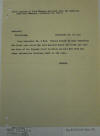
|
29 August
1927.
Message from Munroe
[Dana Munro ?], US
Legation, Managua, to US Consul A. J.
McConnico, Bluefields.
"(True reading of
Code Message received from the American
Legation, Managua, September 29, 1927.)
¶ AmConsul, Bluefields, September
29, 10 A.M. ¶ Your September
28, 3 P.M. Please report by mail
regarding the facts upon which the suit
against Fagot was based and also the
date of the Supreme Court decision
against him with any other information
throwing light on the case. ¶
MUNROE."
|
|
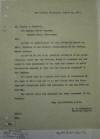
|
31 August
1927.
Letter from US Consul A. J. McConnico,
Bluefields, to Mr. George A. Napoleon,
c/o Bonanza Mines Company, Neptune Mine. "Sir:
¶ Receipt is acknowledged of your
letter of August 14, 1927, relating to
the present difficulties of the Bonanza
Mines Company. ¶ As stated
to you in my previous letter, it is my
understanding, under the law that Mr.
Henry F. Springer has the right to take
possession of the mine and operate it
until he receives payment in full for
the supplies furnished to the Company.
¶ Of course this is a matter that
must be determined by the Laws of
Nicaragua and it is not likely that the
Legation will intervene until all
resources at law has been exhausted.
¶ The letter which you enclosed
has been forwarded to Mr. Warnick.
¶ Very respectfully yours, ¶
A. J. McConnico, ¶ American
Consul."
|
|
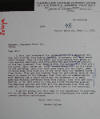
|
2 September
1927.
Letter from
Jacobo
Zelaya to P. Castilla, Manager, Standard
Fruit Ceiba, Honduras.
"Dear Sir:
¶ I have just overheard the
conversation of a Spaniard who has just
arrived from Puerto Cabezas, Nicaragua,
who said among other things: that on
that Coast the Nicaraguans were ready to
rise against Americans and foreigners
who are there on account of the bad
treatment they receive from the latter,
for they are not given light, water and
other things which will be the cause of
the uprising; that they have arms ready
for the fight, some of which arms they
took out of the river when the Yankees
threw them there. They are now
fishing them out and hiding them in the
woods by means of the Indians; that they
are in communication with Sandino and a
short while ago the presence of a small
American warship prevented them from
rising, that they are only waiting to be
left alone to rise and throw themselves
against the American marines and kill
all the Americans they find and sack all
the Company has there and then take to
the mountains. ¶ I am not
giving you this news in expectancy of
anything, but so you may know it and
endeavor to investigate the truth and
prevent anything unfortunate. ¶
Yours very truly, ¶ Jacobo
Zelaya"
|
|
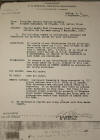
|
5
September 1927.
Special weekly
East Nicaraguan Coast information
bulletin for the week ending 3
September, 1927,
L. B. Green, USS
Rochester, Special Services
Squadron, Balboa, Canal Zone.
"1. The
following report of information,
messages and despatches are herewith
quoted for your information: ¶
BLUEFIELDS: No reports of any
disturbances during elections. Two
squads under one N.C.O. sent to RAMA to
preserve order at polling places.
¶ John L. Medley, pvt., U.S.M.C.,
to be tried by general court martial on
U.S.S. Cleveland: I DRUNKENESS; II
CONDUCT TO THE PREJUDICE OF GOOD ORDER
AND DISCIPLINE. ¶
PRINSAPOLKA: No reports of any
disturbances during elections. One
squad under one N.C.O. ordered to this
town from detachment at PUERTO CABEZAS
to preserve order during elections.
¶ RIO GRANDE: Area all quiet.
¶ EL GALLO: Area all quiet.
¶ PUERTO CABEZAS: ¶
Lieutenant Connette’s force augmented by
(11) eleven marines from U.S.S. TULSA on
31 August. This detachment was
retuned aboard TULSA on 4 September.
It is reported that there is serious
labor agitation in this town. Two
fires of incendiary origin occurred on
property of Bragmans Bluff Lumber
Company. Efforts are being made to
substantiate report that SANDINO is
headed down RIO WAWA. ¶ 2.
No personality reports are being
enclosed with this week’s report.
¶ L. B. GREEN, 2d, by direction."
|
|

|
1.
8
September 1927.
Intelligence
Report, Capt. D. J. Kendall, Bluefields,
p. 1.
"1. The
following intelligence report is
submitted by this office under the
sub-headings as specified in the
reference: ¶ a.
GENERAL STATE OF
TERRITORY OCCUPIED. ¶
The Department of Bluefields is
gradually returning to normal. The
animosity engendered by the revolution
between the two political parties is
decreasing. ¶ The Department
of Bluefields and the Territories of San
Juan del Norte and Cabo de Gracias are
in a generally peaceful state. The
presence of Sandino with a band of about
25 men was rumored in the vicinity of
PIS PIS mines about two weeks ago but
has not been confirmed as yet. His
presence was also rumored in the
vicinity of La Cruz on Rio Grande about
10 days ago but it has also been
impossible to confirm this.
Natives in the vicinity of Kukra Hill
[Cukra Hill] and La Cruz on the Rio
Grande are believed to be in possession
of some arms but it has been impossible
thus far to locate the deposits. ¶
ATTITUDE OF CIVIL
POPULATION TOWARDS FORCES.
¶ The attitude of the conservative
part of the population has always been
favorable towards the force. The
Liberal element had up to the last month
been unfavorably disposed towards the
force as they held the force responsible
for robbing them from the fruits of what
they regarded as certain victory.
Of late the attitude of the
Conservatives seem to be turning against
the force as they realize that they will
not get any of the immediate
improvements that they expected such as
good roads and schools, sanitation, and
the Nicaraguan Canal. On the other
hand the Liberals are more . . . "
|
|
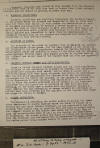
|
2.
8
September 1927.
Intelligence
Report, Capt. D. J. Kendall, Bluefields,
p. 2.
" . . .
favorably disposed than before as they
realize that the presence of the force
here is all that they have to insure
them a fair national election and the
chance of getting in power that way.
¶ c.
ECONOMIC CONDITIONS. ¶
Economic conditions are improving
throughout the district except in the
place where the Indians are compelled to
rely on their shotguns for their meat
ration. In such places the
restrictions on sale of shotguns and
ammunition is working a severe hardship
on these people who rely on their
shotguns to give them their meat supply
as well as localities where persons need
shotguns to protect their domestic
animals and themselves in fact, from the
depreciations of predatory animals such
as the jaguars and serpents with which
most localities in this district abound.
¶ d.
ATTITUDE OF PRESS. ¶
The attitude of the press is tolerant
both as regards the Liberal and
Conservative native press, for the same
reasons as set forth for the attitude of
the civil population towards the forces.
Formerly the Conservative press was
actively in favor of the force and the
Liberal press opposed. Several
negro race papers printed in English
such as the “Crisis” are widely read by
the negroes here and they are against
the force. ¶ e.
FRICTION BETWEEN
TROOPS AND CIVIL POPULATION.
¶ There is little friction between
troops and the civil population.
The attitude of the civilians is
tolerant in general. Two
regrettable incidents have occurred here
lately, one in which a Marine and a
Native Policeman both were drunk on
guard, and during an altercation over
the bottle of aguardiente the Marines
rifle was accidently discharged and the
native was wounded. It has
apparently caused very little discussion
or hard feeling. The majority of
the population seem to blame the native
policeman and he himself in his
statement requested that the Marine not
be punished as they both had been
drinking. In the other case a
Marine shot and slightly wounded a negro
liberal who was attempting to escape
arrest. No criticism or protest
have been received and the majority of
the negroes even blame the negro for
trying to escape. ¶ f.
POLICE
OPERATIONS. ¶ The
command is assisting the native police
to police the towns where stationed.
In Puerto Cabezas where the Chief of
Police is a Liberal and his force
Liberal likewise, as are practically all
the natives, very little help is
required from the Marines except during
the frequent fights in the native town
where due to their lack of arms the
native police have to call on the
Marines for assistance. In
Bluefields, the native police and Chief
of Police are Spaniards from the
interior, and the population is
predominantly negro liberals. The
native police being unarmed except by
clubs are of little use . . . "
|
|
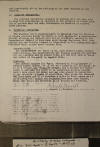
|
3.
8
September 1927.
Intelligence
Report, Capt. D. J. Kendall,
Bluefields,
p. 3.
" . . . and
practically all of the policing of the
town devolves on the Marines. ¶
g. MILITARY
OPERATIONS. ¶ The
military operations consists of patrols
sent out from time to time when
information is received of the presence
of hidden arms, and of patrols sent out
when information is received of rumored
armed parties. ¶ h.
POLITICAL
SITUATION. ¶ The
election for a representative to
Congress from the district of Siquia
occurred Sunday September 4, with
apparently a Conservative victory
although the ballots will not be
officially counted by the Departmental
Council of Elections until Sunday
September 11th. Both parties are
now looking forward in Bluefields to the
coming municipal elections which occur
about October 15th. ¶
CONSERVATIVES.
¶ The Conservative for Mayor is
Dr. Jose Dolores Arana [José Dolores
Araña], former Jefe Politico. The
Conservatives are working quietly but
actively for his election and he should
bring out the best vote of which any
member of his party is capable here.
¶ LIBERALS.
¶ The Liberal nominee for Mayor,
selected in the primaries is General
Eliseo Duarte. He is not well
liked by all his party. He is of a
violent and vengative [sic;
vengeful] nature, and a nominee not
calculated to maintain his party in an
harmonious accord. General Daniel Mena
about two weeks ago was also placed in
nomination by the Liberals by means of a
petition. This gives the Liberals
two Candidates and if it produces a
split in their ranks as it is believed
will occur the Conservatives have some
chance, which they would not otherwise
do of winning the election. ¶
Donald J. Kendall."
|
|

|
1.
8
September 1927.
Report of
investigation of wounding of native by
Marine Sentry, Capt. D. J. Kendall,
Bluefields, p. 1.
"1. The facts
revealed from the investigation I have
made show that the shooting was
justifiable and Private Bettis was
therefore released from arrest and
restored to duty. ¶ 2. From
the investigation which I have made I
believe the following facts to have
transpired: ¶ Private
William C. Bettis, U.S. Marine Corps,
while on patrol in the city of
Bluefields, Nicaragua, was passing in
front of the Bluefields Mercantile
Company store at about 3:00 a.m.
September 1, 1927, when a colored woman
reported to him that she had been beaten
up by a colored man. Her face was
badly bruised and marked up by the blows
she had received. She gave a description
of the man and indicated the direction
in which he had gone. Private
Bettis loaded a clip in the magazine of
his rifle and went out in the direction
she had indicated in search of the
criminal. At a dance in the negro
district he saw a man on the porch of
the dance hall fitting the description
of the negro, and the man was telling
some other negroes about having had a
fight with a woman. Private Bettis
believing he was the man he was
searching for put him under arrest.
The negro, Edwin Timpson, asked
permission to go inside the hall and
leave a glass which he had in his hand
before going with Bettis. Bettis
gave him this permission and following
him into the hall where Timpson put down
the glass. Bettis was following
him as he went out through the door.
As soon as Timpson got out on the porch
he made a break and ran. Bettis called
to him twice . . . "
|
|
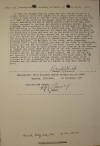
|
2.
8
September 1927.
Report of
investigation of wounding of native by
Marine Sentry, Capt. D. J. Kendall,
Bluefields, p. 2.
" . . . to halt
but Timpson kept on going and just
before he got to a corner where he could
have dodged out of sight Bettis fired on
him causing a flesh wound in the left
side. Timpson kept on running and
went down to the shore of the lagoon
where he laid until Bettis stopped
searching for him to report having fired
at the man. Then Timpson returned
to his home and called a civilian
Doctor, Dr. Brayshaw. Bettis reported to
the Corporal of the Guard by telephone
near the scene of the shooting at about
3:20 a.m. The Corporal of the Guard
called the Sergeant of the Guard who
reported the case to the Commanding
Officer and went out to the scene of the
shooting and together with Private
Bettis searched for the man until about
4:10 a.m. when Bettis was relieved from
post, and placed under arrest by the
Commanding Officer pending an
investigation. At about 6:30 a.m.
Corporal Robinson, the Sergeant of the
Guard, while inspecting sentries heard a
woman shrieking and went to the house to
investigate, finding that she was the
mother of the Edwin Timpson that had
been shot. He was informed by
other persons in the house as to the
location of Timpson and going there
found that he had been treated by Doctor
Brayshaw. Doctor Brayshaw stated that
the man was not seriously wounded.
The man who was shot, Edwin Timpson, was
not the man who was reported to Private
Bettis for beating the negro woman.
He was however guilty of a more serious
charge, attempted rape, which combined
with the knowledge that the Marines
carried their rifles unloaded was the
reason he ran and failed to stop when
ordered to halt. ¶ Donald J.
Kendall ¶ HEADQUARTERS FIFTH
REGIMENT SECOND BRIGADE MARINE CORPS
¶ MANAGUA, NICARAGUA, 16 September
1927. ¶ Approved and filed.
¶ B. S. BERRY."
|
|
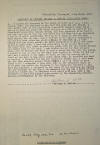
|
3.
8
September 1927.
Report of
investigation of wounding of native by
Marine Sentry, Capt. D. J. Kendall,
Bluefields, p. 3. Statement of
Private William C. Bettis, USMC, 1 Sept.
1927.
"STATEMENT OF
PRIVATE WILLIAM C. BETTIS, U.S. MARINE
CORPS. ¶ 1. I called the
Corporal of the Guard at about 2:45 a.m.
1 September 1927, and reported to him
that the post was all secure. I
then walked down the Bluefields
Mercantile Company store which was on my
post and found two women sitting on a
box in front of the Bluefields
Mercantile Company store, and they
reported to me that a man had beat one
of them up. The woman who had been
beat up described a man to me and I
immediately went up to a dance on the
Old Bank Road looking for the man.
When I arrived at the dance I overheard
a man telling some other men about a
woman he had beat up. I then placed that
man under arrest. He asked
permission to go in the house to put a
glass down. I gave him permission
to go in and went into the house with
him. After putting the class down
the man turned around and walked back to
the door. I was behind him at the time
at port arms. When he reached the
door he made a break and ran into the
street. I called to him to halt at
the same time loading my rifle. He
did not halt and I called to him again
to halt. He kept on running and I
fired at him when he was about fifty
yards away. He stumbled and kept
on running. I searched for him but could
not locate him. I told some men
who were standing around there (about 5
or 6 of them) to wait there until I
returned. I then went down to the
telephone which is on my post and called
the Corporal of the Guard and reported
to him what had happened. I
returned to the scene of the shooting
and waited for the Sergeant of the
Guard. We searched for the man I
fired at but could not locate him. He
searched until about 4:10 a.m. when I
was relieved off post and placed under
arrest by the Commanding Officer,
pending investigation of the shooting.
¶ William C. Bettis"
|
|
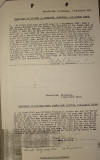
|
4.
8
September 1927.
Report of
investigation of wounding of native by
Marine Sentry, Capt. D. J. Kendall,
Bluefields, p. 4. Statements of
Corporal Hillery L. Robinson, USMC, and
Private First Class Mark Loveirx, USMC, 1
Sept. 1927.
"STATEMENT OF
HILLERY L. ROBINSON, CORPORAL, U.S.
MARINE CORPS . ¶ 1. At about 3:10
a.m. or 3:15 a.m. on 1 September 1927,
when I was Acting Sergeant of the Guard,
the Corporal of the Guard came to me and
woke me up saying, “Private Bettis a
sentry on post had shot a man.” I
then got up and notified the Commanding
Officer and then went out to the scene
of the shooting. Private Bettis the
sentry on post and I searched all around
the scene of the shooting but could not
locate the man. Private Bettis was
relieved about 4:10 a.m. and placed
under arrest by the Commanding Officer.
About 6:30 a.m. while I was inspecting
sentries near the scene of the shooting
I heard a woman shrieking, and went to
her house to investigate. I found
out that she was the mother of Edwin
Timpson, the man who had been shot.
From some people in her house I located
the whereabouts of Edwin Timpson.
He was at the home of his brother and
received information that he had had
medical treatment from Doctor Brayshaw,
a physician of Bluefields, Nicaragua.
I then found a witness to the shooting,
Kit Hodson. I then came back to the
barracks and made my report to the
Commanding Officer. ¶
Hillary L. Robinson ¶¶
STATEMENT OF PRIVATE FIRST CLASS MARK
LOVEIRX, U.S. MARINE CORPS. ¶
1. At about 2:45 a.m. Private William C.
Bettis who was the sentry on post No. 2
called me and reported that the post was
secure. At about 3:20 a.m. Pvt.
Bettis called me again and told me that
he had shot at a man but was uncertain
about having hit him as he had ran away
and could not be found. I told him to
search the neighborhood of the shooting
and to see if he could not find the man
and report to me the results of the
search. I did not hear from him
anymore. I went over and told the
Sergeant of the Guard who was asleep all
that had been reported to me, and also
told him that it was uncertain about the
man having been hit as he could not be
found. I was relieved off post about
4:10 a.m. ¶ Mark Loveirx"
|
|
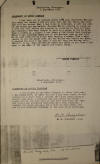
|
5.
8
September 1927.
Report of
investigation of wounding of native by
Marine Sentry, Capt. D. J. Kendall,
Bluefields, p. 5. Statements of
Edwin Timpson and Doctor Brayshaw,
Bluefields, 1 Sept. 1927.
"STATEMENT OF
EDWIN TIMPSON ¶ I had been
out to urinate about 1:30 a.m. Clarencia
Willson was under the house. I did
not know that she was there. She
went and told her mother that I had
tried to hold her. I left the side
of the house and her mother, Paulina
White, started to curse me. I told
her that before she started to curse me
to find out what had happened. She
went inside to pick up a glass to hit me
with. Then I picked up a glass.
I had taken a few drinks that evening.
While I was standing there one of the
Marines came up and told me to come with
him as I had been beating a woman.
Then I went inside to put the glass down
and the Marine was behind me. When
I reached the door I ran away. I
did not hear the Marine call, “Halt” to
me. Then the Marine fired his
rifle at me. Then I ran down to
the edge of the lagoon and stayed there.
¶ EDWIN TIMPSON ¶¶
STATEMENT OF DOCTOR BRAYSHAW ¶
I was called to see Edwin Timpson at
about 4:00 a.m., 1 September 1927, to
treat him for a gunshot wound. He
was sitting in a chair when I reached
the house complaining of having been
shot. I examined him and probed
the wound. I found that he had
been shot in the left side from the
rear. The bullet was evidently deflected
by a rib, slightly. I dressed the
wound and gave him a shot of anti-toxin.
The man is not seriously wounded, to the
best of my knowledge. ¶ M.
M. BRAYSHAW, M.D."
|
|
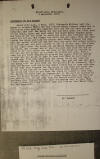
|
6.
8
September 1927.
Report of
investigation of wounding of native by
Marine Sentry, Capt. D. J.
Kendall,
Bluefields, p. 6. Statement of Kit
Hodson, Bluefields, 1 Sept. 1927.
"STATEMENT OF KIT
HODSON ¶ About 3:00 a.m., 1
Sept. 1927, Clarencia Willson left the
house to urinate. While she was
outside Edwin Timpson asked her to let
him go with her. She answered that
she did not want any man with her.
She left the where she was and went
under the other side of the house.
After she went under the house Edwin
Timpson grabbed hold of her and tried to
throw her down. She screamed but
he would not let go. She fought
him until she got away. Then she
came inside the house and told her
mother what Edwin Timpson had done her.
Her mother would not believe what she
said. Her mother borrowed a
flashlight and went outside to see if it
was true. She flashed the light
under the house and saw Edwin Timpson
dodging under the house. She
accused him of what the girl had told
her and he tried to hit her. After
she had gone in the house he started to
hit her and she picked up a glass.
He picked one also. Then I came
out and asked Timpson to give me the
glass. Then he wanted to know who
was going to take it from him.
When he said that I turned away from
him, went into the house. On my
way back out I met a Marine. The
Marine said to him, “Are you the man
that had the scrap with the girl with
the red garters?” He answered,
“No.” Then the Marine told him he
was under arrest and to come with him.
At the same time Timpson had the glass
in his hand and asked the Marine to let
him put it away. The Marine went
behind him into the house and after he
put down the glass he turned to come
out. The Marine followed him.
As Timpson got to the door he started to
run. The Marine called, “Halt.”
I asked Timpson what the Hell he was
running for. At the same time the
Marine called halt again and then when
Timpson did not halt the Marine shot at
him. This is all I know until his
brother came and told me that Edwin
Timpson had been shot. ¶ KIT
HODSON"
|
|
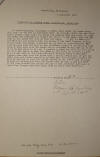
|
7.
8
September 1927.
Report of
investigation of wounding of native by
Marine Sentry, Capt. D. J. Kendall,
Bluefields, p. 7. Statement of
Paulina White, Bluefields, 1 Sept. 1927.
"STATEMENT OF
PAULINA WHITE, BLUEFIELDS, NIACARAGUA:
¶ My grand-daughter, Clarencia
Willson, went under the house about 1:45
a.m. on the 1st of September 1927, to
urinate. While she was there Edwin
Timpson came under the house and grabbed
her and tried to throw her down.
She screamed and fought him until he got
away. When she got back in the
house she told me what had happen. I got
a flashlight and went out and looked
under the house. I saw Edwin
Timpson dodging around under the house.
I accused him of what my grand-daughter
had told me, and told him that he was
worthless trying to do anything like
that. I went back into the house
and he followed me and came up to me as
if he was going to hit me. I
grabbed a glass and told him that if he
hit me I was going to mash the glass in
his face. He grabbed a glass also.
I sat down in the house and while
sitting there I saw Edwin Timpson come
back into the house with a Marine behind
him. He put the glass down and
turned around to go back out. When
Timpson reached the door he started to
run. The Marine called to him three time
to stop. He kept on running and
then the Marine shot at him. I did
not know at the time whether the Marine
hit him or not. At about 4:00 a.m.
I heard that Timpson had been shot.
That is all I know about it. ¶
Paulina White"
|
|
|
|
|
PREVIOUS
NEXT
|
|
|
|
|
|
|
|
